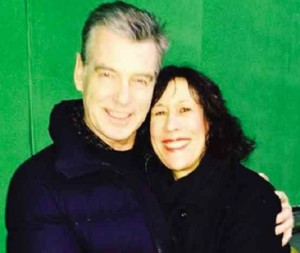
CANNON (WITH PIERCE BROSNAN, LEFT). Teaches actors to use different parts of themselves to suit the material they’re working on.
Pierce Brosnan calls her instructive to me, “In-Depth Acting,” a “book of knowledge and hard-earned commitment to the art of acting that will stand the test of time.”
On our recent visit to London, she couldn’t meet us on the day we first suggested, because she had a coaching session with Ed Westwick (“Gossip Girl”), who was in the UK to shoot his latest film.
We’re talking about Dee Cannon, who codirected us in the 2006 Singapore production of NVC’s “Aspects of Love.” We couldn’t wait to catch up with Dee because it has been six years since we last saw her, when we watched Juan Antonio Bayona’s creepy chiller, “The Orphanage,” with Monique Wilson in a moviehouse near Notting Hill.
Students
Dee taught at the Royal Academy of Dramatic Art (Rada) for 17 years and, as Wikipedia aptly notes, is one of England’s top acting coaches. Her students include Tom Hiddleston (“Thor’s” Loki), Gemma Arterton (“Quantum of Solace”), Ramin Karimloo (“Love Never Dies”) and Cynthia Erivo (“I Can’t Sing: The X Factor Musical”).
You have a rare chance to learn from Dee when she visits Manila next month for a series of workshops in her 10-Day Acting Camp, scheduled on June 23-July 4. E-mail Ampy Sietereales (info.bloomsbury@gmail.com) now for more details.
In her book, Dee talks about why actors need to train, auditioning and developing a character—personalization, objectives, psychological and scenic actions, sense, affective and emotional memories, finding “different” truths, etc.
Technique
She shares, “My book gives an actor reasons for his actions—that way, he’s not just guessing and faking it. It justifies why technique is important. Yes, an actor can wing it on instinct and natural talent—but, I don’t think he’ll be able to sustain it without technique. Along the way, he’ll end up playing characters that are close to who he is—and he becomes limited.
“Some actors have big egos—but, a bloated sense of self has no place in this line of work. Leave it at home, because when it begins to rear its ugly head, it’ll result in a clash that’s unworkable.”
How different are Filipino actors from their British and American counterparts? Dee replies, “Actors reflect their respective cultures: You have to be familiar with the average English person to understand why British actors do what they do. They’re guarded, private and very good at not showing their feelings—it’s hard to read them.
“That only becomes a problem if the character requires the actor to be expressive. That reflects in the writing of many British plays—there’s a lot of talking, and showing one’s feelings is almost vulgar. But, acting is standard. You have to teach actors to use different parts of themselves to suit the material they’re working on.
“American actors are talkative, emotional and are always in touch with their feelings. Filipino actors are even more emotionally ‘available.’ There’s a lot of over-the-top emotionalizing—but, handled well, it’s a lot easier to pull something back than bring it out!”